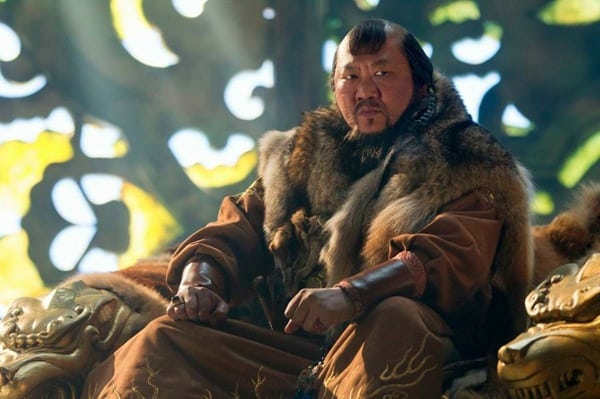
Marco Polo is constantly drowning interesting moments in a lot of pedantic, overstuffed melodrama – and that season-long trend continues in “Prisoners”, which continues Jia’s unchallenged (okay, he did sprain his wrist slightly) climb to the top of the Song dynasty, while Khan and his council lick their wounds back on the home turf. Buried deep within Jingim’s silliness and the Blue Princess/Marco story that makes no sense (but is suddenly important) is a much more interesting version of Marco Polo, one that observes what people will do when their backs are squarely against the wall.
Of course, a lot of this leads to head-scratching decisions, chief among them Yusuf’s confession to Kublai Khan at the end of the hour. Had we spent some real time with the character throughout the season, it might be a little more clear whether his sacrifice is under some pretense of nobility, or just the honest words of a man not willing to see another die for what he’d done. However, Polo‘s fixation on exciting moments rather than developing characters come back to haunt it here; it’s completely unclear what ends Yusuf was serving at the end of “Prisoners”; he talks to Marco about being the “free man” now that he’s been ‘convicted’ of treason (a fate he seals by sending letters out to every single leader in the empire, something that takes a whole lot of coordination ahead of time), and generally acts like a man who has come to peace with his decision. But was it for Marco, or for fear of his own corrupt soul?
See, Marco Polo tries at times to dip into the existential debates between different philosophies and theologies in the time of its world; again, these things are never developed beyond the superficial into something characters (and by the same token, audience members) can grasp onto, never giving real context to the religious wars at play in this world, save for the Khan quoting the Bible while being afraid a Vatican assassin is coming to kill him. Religion is but a toy in the play room for the Polo writers, and they never use it to their advantage; and when it comes to characters like Yusuf and Marco (whose different deities don’t preclude them both from accepting death in similar fashion), Polo lacks the insight or complexity of character to turn those fleeting moments of enlightenment into something more.
The problem – with “Prisoners” and season one as a whole – is the show’s inability to turn a thing into something more than that, something meaningful. Take the Blue Princess and Marco; they’re just something that exists in the world, a romantic story so forced upon the audience (and so underdeveloped by the nine scripts of the season to this point) that the story can never take flight. Here, Kokochin just doesn’t want to be Kokochin, and wants to run away with Marco to be lovers in the West (I can only presume) – and it makes absolutely no sense, two characters devoted to each other after only two actual interactions between the two, three if you include the attempted murder thing (which, I must add: the show’s gone out of its way to show Kokochin as a woman who isn’t the quickest to adapt, or brutal, which makes her clever little action in episode two make no sense for her character). It’s just a thing that exists on this show, something else to run line after line of overstuffed dialogue to.
Along with the weekly doses of Byamba’s “love” story and Jia murdering a bunch of people without challenge, “Prisoners” is a pretty typical episode of Marco Polo. The biggest problem is that characters continue to do flashy things that don’t make any sense: Jingim berates Marco, then can’t perform in bed with his wife; Hundred Eyes sacrifices himself to the Khan for his complicity in treason he knows wasn’t committed; and Jia continues to push around the Song dynasty like a praying mantis in one of his training bowls… if you’re looking for surprises, “Prisoner” doesn’t have it, continuing down the same overwrought path Marco Polo‘s been on since the third episode.
[Photo via Netflix]
 Follow Us
Follow Us





